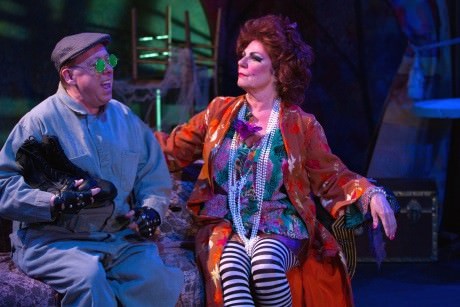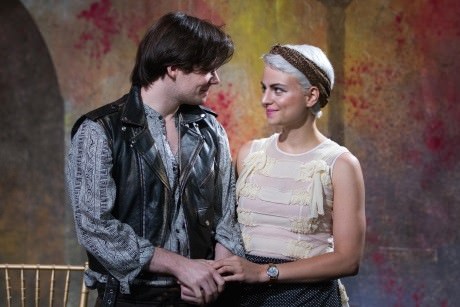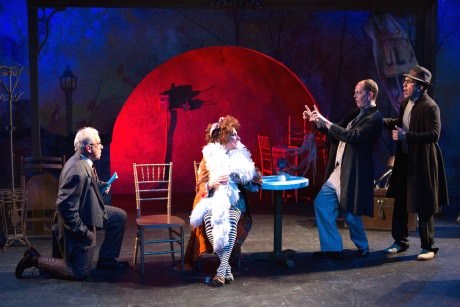WSC Avant Bard’s current production of Giraudoux’ The Madwoman of Chaillot, an entertaining tribute to the power of joy over despair, reminds us of the importance of the artist in an inevitably compromised world.
The premiere, in December, 1945, was viewed as a triumph over the Nazis, and a celebration of victory. The illustrious author, Jean Giraudoux, was dead, and there were rumors, probably untrue, that he had been poisoned by the Germans. Director Louis Jouvet, was a longtime associate of Giraudoux, and a leading figure in French theatre himself. Jouvet had just returned from a long exile in South America, where he and his company suffered privation rather than struggling with the horrors of the Paris occupation.

The opening of Madwoman was the beginning of a new era. German soldiers were not present. All of Paris (le tout Paris) was there, including General deGaulle. It was not difficult to see the parallels between the evil financiers and the occupying Germans, with Aurelie, the Madwoman, representing the real France, the epitome of literary culture with a philosophy of generosity and kindness, at least towards those who are not evil financiers. But the real story is slightly more complicated.
Paris in 1943, as Giraudoux was writing his play, was still under occupation. Jean-Paul Sartre notes in Paris Under the Occupation (Lisa Lieberman, tr., 2011, www.nowandthenreader.com) that when friends disappeared, cries of horror split the night. The Gestapo often arrested people between midnight and five in the morning. “Three friendly Germans with revolvers” would appear. Houses were closed up or destroyed. He describes a people who fear that they have lost their future and their soul.
Giraudoux, like many theatre artists, remained in Paris. Separated from his wife, he lived in a small hotel in the rue Cambon, struggling to keep warm, with his poodle Puck for company. Friends describe him as often to be found “sitting in bed with a hot water bottle, wrapped up in a heavy sweater”, according to Donald Inskip in Jean Giraudoux: The Making of a Dramatist (Oxford University Press, 1958.) What must his thoughts have been as he worked? His mother died near the end of 1943. Inskip quotes his remarks to his son Marc, “This idea of the uselessness and laughableness of all our efforts… haunts men of my age… and makes our closing years dark and imprisoned.” Yet his friend, poet and novelist Louis Aragon, who met Giraudoux shortly before his death on Jan. 31, 1944, describes him as full of optimism. “He was full of plans for writing, full of plans for happiness,” as Inskip relates.
How did he feel about Americans? “They come to France,” he wrote, “to study the architecture of happiness in the hearts of French women, and go racing back to Minneapolis to plant it in the hearts of gigantic girls usually called Watson.” As a writer, he has been described as a “precieux”, a word which suggests artfulness, or artifice, with an emphasis on style. In The Madwoman of Chaillot, he dramatizes the conflict between the sinister baron, broker, and prospector who conspire to destroy Chaillot in order to exploit its oil, and the Madwoman, an eccentric resident who represents everything the district has to offer in terms of goodness, beauty, and love.
As the Madwoman, Cam Magee has a lightness of spirit that belies her strength and conviction when she is prompted to act. She has precisely the je ne sais quoi the character needs. Her fellow Madwomen, Anne Nottage (Constance, Madwoman of Passy), Tiffany Garfinkle (Gabrielle, Madwoman of Saint-Sulpice), and Christine Hirrel (Josephine, Madwoman of la Concorde) display an overwhelming love for fantasy. One has an invisible dog; another invites imaginary people to tea; another, a member of a family of lawyers, notes that all criminals are represented by their opposites. Each Madwoman is beautifully played and ingeniously costumed, and all unite to place the forces of darkness on trial.
Other sympathetic characters are the lovely Irma, the Dishwasher, performed with flair by Daven Ralston; Martial, the Waiter (the droll Tony Greenberg, who also does a very funny turn as the Sewer-Man); Gaston, the Busboy (the very likeable Jose Martinez); and the Lifeguard (James Finley, who also does a masterful job as the Ragpicker). Zach Roberts as Pierre, who becomes enchanted with Irma, is sweet-natured and kind. He and Ralston make an appealing pair of young lovers. In minor roles Denise Marois and Gray West add to the overall charm and dignity of the production.

Arraigned against the formidable Madwomen is a gallery of criminals (well, they think of themselves as businessmen); one more dishonorable than the next. Jay Hardee, as The Chairman of the Board, has a ferocious energy and humor; the fact that he is nothing like any Chairman of the Board you could ever meet just adds to the fun. Kim Curtis, as The Baron, an aristocrat who preys on young women, is appropriately self-satisfied and scheming. The Stock-Broker (Joe Palka) and the Prospector (Theo Hadjimichael) enjoy their machinations, projecting an insidious glee.
The physical production is, quite simply, splendid. Set and Costume Designer Collin Ranney has created a feast for the eyes, with costumes that brim with imagination and a set that suggests the beauty and magic of Paris. Lighting designer Christopher Annas-Lee and Sound Designer Frank DiSalvo Jr. convey with subtlety and grace the many beauties of the production. The music of Edith Piaf is featured, and cast members Daven Ralston, Zach Roberts, and Tony Greenberg sing some lyrical French classics (notably, Padam) at intermission. Choreography by Jane Franklin adds enormously to the vivacity and sparkle of the proceedings. Director Christopher Henley deserves enormous credit for the creativity, attention to detail, and obvious passion he has devoted to this otherworldly play.
Laurence Senelick, Fletcher Professor of Drama and Oratory at Tufts University, has done a new translation which, to his mind, avoids the blandness of the popular Maurice Valency version. He has succeeded beautifully, although there are a few slight imperfections; somehow incriminating letters and the modern language of the stock market don’t quite fit together. Still, he seems to hit just the right note when he refers to the play as a fairy tale.
In its time, Madwoman was viewed as a fable of the French Resistance. Some maintain that in the wake of the Liberation, with the purges of Nazi sympathizers like the novelist Robert Brasillach, the French needed to view Giraudoux as great. It is true that he was no hero of the Resistance, but neither was he a collaborator. He was first and foremost, an artist, and as such fulfilled his major responsibility, which was to be a witness.
Today, his work seems startlingly prescient. The triumph of the 1% sometimes leaves the rest of us wondering what happened to the American dream. Whatever your dream is, in America you used to feel that you had the opportunity to accomplish it. That opportunity is vanishing, at a rapid rate. Giraudoux reminds us that poetry and love are eternal, and have nothing to do with one’s bank balance, station in life, or ability to succeed by manipulating others. He was a man of many faces: World War I veteran, diplomat, and novelist. In 1940, his son Jean-Pierre joined De Gaulle in London. Although he appeared at the salon of Florence Gould, who came under scrutiny in the postwar period for protections she enjoyed during the occupation, his political positions evolved. By 1943, he was sending reports about intellectual life in Paris back to London.
In one sense, the Nazis interfered less with the theatre than with some of the other arts. In his marvelous book, And the Show Went On: Cultural Life in Nazi-Occupied Paris, (Knopf 2010), Alan Riding cites a number of actions which were certainly inhuman. The theatre was purged of Jews. Theatre Sarah Bernhardt was renamed the Theatre de la Cite, because Bernhardt was Jewish. Riding writes:
“In early 1942, an eight p.m. curfew was imposed on Jews in Paris, making it risky for them to attend shows. In May, they were required to wear yellow stars. In July, they were prohibited from entering all theaters. And in the fall of 1942, Jews were formally banned from appearing on stage. Jewish playwrights were blacklisted early in the occupation, although every new production—text, cast, and even décor—was subject to censorship, with texts scanned for any anti-German or excessively nationalistic sentiments.”

Giraudoux’ tendency in those unhappy times was to withdraw, but he was still an immensely prestigious writer. When Jouvet produced Madwoman successfully after many setbacks and hindrances, he hastened to pay tribute to his old friend. He had gone to South America, he said, partly for this reason: the (actually brief) banning of Giraudoux’ work by the Nazis. In addition, Jouvet’s exile added to his appeal in a time when those who supported the Nazis were being put on trial, deported, and in some cases executed. Suddenly those who had the moral courage to resist the Germans were celebrated, whereas those who had been favorite Nazi artists, such as sculptor Arno Breker, became controversial. Breker was ruled a “fellow traveler” of the Nazis and fined. Although he was relatively successful for the rest of his life, his past was still noticed and deplored.
Along with the many images of bravery amid the Occupation, perhaps it is time to add one more. A small one: the lonely perseverance of the writer. And we can see Jean Giraudoux, alone, cold, surrounded by books, papers, and his loyal dog. Writing.
Running Time: Two hours and 45 minutes, with one 15-minute intermission.
The Madwoman of Chaillot plays from through 28, 2015 at WSC Avant Bard performing at Gunston Arts Center, Theatre Two – 2700 South Lang Street, in Arlington, VA. For tickets, call the box office at (703) 418-4808, or purchase them online.
LINK
David Siegel’s review of The Madwoman of Chaillot on DCMetroTheaterArts.





